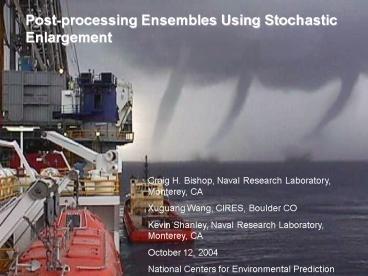Postprocessing Ensembles Using Stochastic Enlargement - PowerPoint PPT Presentation
Title:
Postprocessing Ensembles Using Stochastic Enlargement
Description:
Postprocessing Ensembles Using Stochastic Enlargement – PowerPoint PPT presentation
Number of Views:52
Avg rating:3.0/5.0
Title: Postprocessing Ensembles Using Stochastic Enlargement
1
Post-processing Ensembles Using Stochastic
Enlargement
Craig H. Bishop, Naval Research Laboratory,
Monterey, CA Xuguang Wang, CIRES, Boulder
CO Kevin Shanley, Naval Research Laboratory,
Monterey, CA October 12, 2004 National Centers
for Environmental Prediction
2
What is an Ensemble Forecast?
- A collection of forecasts from multiple numerical
model runs (different initial conditions,
different models/parameterizations, etc)
NOGAPS Navy Operational Global Atmospheric
Prediction System
Iso-height lines of 500 hPa surface from
FNMOCs NOGAPS ensemble
3
What is a probability forecast?
36 hr probability forecast from NOGAPS ensemble
- Shows the probability of occurrence of an event
(here, sfc wnds gt 25 kt ) - P(event) ( exceeding threshold) / (total )
4
The Distribution of Verifying Observations Given
an Ensemble Forecast Category
- Suppose one had access to an infinitely long
historical record of ensemble forecasts and their
corresponding verifying observations/analyses. - With such a record, one could define
distributions of verifying observations for any
ensemble forecast category.
Example Find distribution of verification for
forecast events in which 4.9Clt (ensemble mean T)
lt 5.1C, and 3.9 lt (ensemble standard deviation of
T) lt 4.1C from historical record.
- If ensemble members drawn from distribution of
verifications then the probability of an event
occurring, given the forecast category, is - P(event) ( members exceeding threshold) /
(total )
5
Ideal Single model Ensemble Ensemble members
formed by adding random perturbations to control
forecast. Each perturbation drawn from
distribution of errors in control forecast.
Ideal Multi-model Ensemble Ensemble members
formed by adding random perturbations to
verification. Each perturbation drawn from
distribution of errors in control forecast.
Ideal Single Model Ensemble with Model
Error Ensemble members are random perturbations
to control forecast. Each perturbation drawn from
narrower distribution of errors in control
forecast.
6
4-member ensemble
True error Variance
Sample Variance
7
128-member ensemble
True error Variance
Sample Variance
8
- Typical problem of ensemble
Observations fall outside the range of ensemble
with a margin and frequency that cannot be
explained by observational errors.
- Postprocess ensemble with stochastic
enlargement. - Add statistical perturbations to each dynamic
ensemble member to augment the spread (Roulston
and Smith 2003).
9
Post-processing Ensembles Using Stochastic
Enlargement
Seasonal distribution of ensemble members about
ensemble mean
Seasonal distribution of truth about ensemble mean
(a)
(b)
Addition of stochastic perturbations to single
member
Seasonal distribution of stochastically enlarged
ensemble about ensemble mean
(c)
(d)
10
Best member dressing (Roulston and Smith 2003)
- Idea Statistical perturbations are drawn from
historical archive of best member errors.
- limitation May still not reliably predict
forecast error (co)variance. Best-member dressed
ensemble may be overdispersive or underdispersive.
11
The New Dressing Kernel
Idea let , choose so that
Derived
(a)
(b)
(c)
(d)
12
Experiment on CCM3 ETKF ensemble
- Variables 500mb U over 14 sites of eastern USA
- Verifications NCEP/NCAR reanalysis
- Cross-sample test Training statistics for bias
and dressing perturbations are built from 1999
summer. Forecasts and evaluations are made for
2001 summer. - Another limitation of the best member method
Sub-space to identify the best member is
uncertain.
13
500mb U rank histogram
14
500mb U Brier Score
- All dressed ensembles have significantly better
scores than the undressed at longer lead times. - New kernel has significantly better score than
RS-10d-globe at 1-2day lead times. - Score of RS-10d-globe is the worst among dressed
ensembles. - Bootstrap resampling to test the statistical
significance
15
Application Cooling degree days (CDD) forecasts
at Boston
CDD definition where Ti is daily average 2m T
for the ith day of Nd-day period
- Application of dressing
- Dress Ti ensemble from CCM3 ETKF outputs to
augment CDD ensemble. - Temporal correlation of forecast errors of Ti
needs to be considered. - New kernel designed to produce reliable estimate
of covariance of Ti forecast errors.
16
Rank histogram for CDD ensembles
- New kernel dressed CDD ensemble has more
reliable spread
17
TABLE 2. CALL/PUT RETURN MEASUREMENTS ON THE WB
DRESSED AND FIX 3-DAY CDD ENSEMBLES.
18
Summary
- The new stochastic enlargement procedure produces
reliable estimates of the second moment of the
forecast errors, whereas best member enlargement
does not. - ETKF ensemble becomes more skillful after
stochastic enlargement. - CDD ensemble augmented by the new kernel is more
skillful than that augmented by the best member
method.
19
Stochastic enlargement currently confined to
space of routinely observed variables
- Problem Routinely observed variables are few and
far between in typical Naval battle-space
environment. - Solution Use globally balanced but quick to
obtain domain filling perturbations to
stochastically enlarge the ensemble. - Examples of balanced but quick to obtain
perturbations - Random draws from rescaled histories of forecast
perturbations or from parameterizations of such
distributions. - Random draws from distribution based on
space-time deformation.
20
Space-time deformation stochastic perturbation
normal
Surface pressure change solely due to horizontal
field shift of potential temperature field.
shifted
21
Boundary of mesoscale model
22
Future stochastic enlargement work should account
for fact that there are skilful predictors of
forecast error variance other than ensemble
variance.
23
4-member ensemble
True error Variance
Sample Variance
24
128-member ensemble
True error Variance
Sample Variance
25
End































